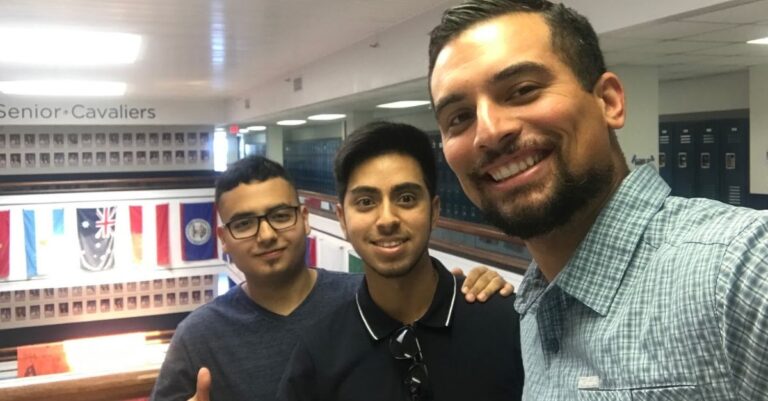Here I am last week with two of my former students, Ovér and Miguel, who were members of our first graduating class last year. I taught them science when they were in 8th grade and was their High School Dean of Students for their four years of high school. Seeing them reminded me of the challenges I faced in moving from a teaching role to an administrative role. The biggest challenge I faced was treating every situation as an “either or” scenario, where it had to be black or white; there was nothing in the middle, no gray area. I got over that by always reminding myself that students are people too.
It’s Easy to Forget that Students are People Too
Now, don’t get me wrong, I loved my students and wanted what was best for them. In my eyes, it was best for them that I treat every scenario as black or white. I believed that society wouldn’t be as forgiving to them, and so, I needed to get them ready.
Here’s a basic example that describes my former approach. “You’re out of uniform, and so, you will be receiving a consequence,” I’d tell a student. Even if she told me that she didn’t wear her shirt because she was embarrassed about a stain she got on it at lunch the previous day. I’d tell her she should have worked it out ahead of time and then I’d continue to assign the consequence.
Changing My Approach
Over time, my response has changed dramatically. I learned that there is so much more behind students’ mistakes than the action that resulted from those mistakes. When we take the time to treat them as people and get to know their stories, we build relationships AND learn more about why they behave the way they do.
Getting to Know My Students as People
Here are a few things I learned about my students:
They want to be heard
Many students will be ok with consequences so long as they feel they were able to share their story and get their point across. I’ve learned that many students simply want to make sure their side of the story was considered before they received a consequence.
They have intricate pasts, both in and outside of school
I once had a student tell me she doesn’t like doing work in Math because she’s bad at Math. When I asked her why she thought that, she told me she’s never passed a math class. This information does so much for me and the student than just assigning her a consequence!
They have dreams and desires for their futures
When you know where a student wants to go, you can actively help her get there. When a former 9th grader realized that he would need letters of recommendations from his teachers to apply to college, he immediately changed his disrespectful behavior toward them.
Thinking of My Students as People First
It’s amazing how my relationships with students changed after I started to think of them as people, first and foremost. While I still hold them accountable, I also take the opportunity to get to know who they are and why they behave in certain ways. Now, when I see a student out of uniform, I ask them for an explanation and give them an opportunity to explain themselves. 90% of the time their consequence doesn’t change, but our relationship improves instantaneously because they notice I care about who they are, not just what they do or don’t do.



